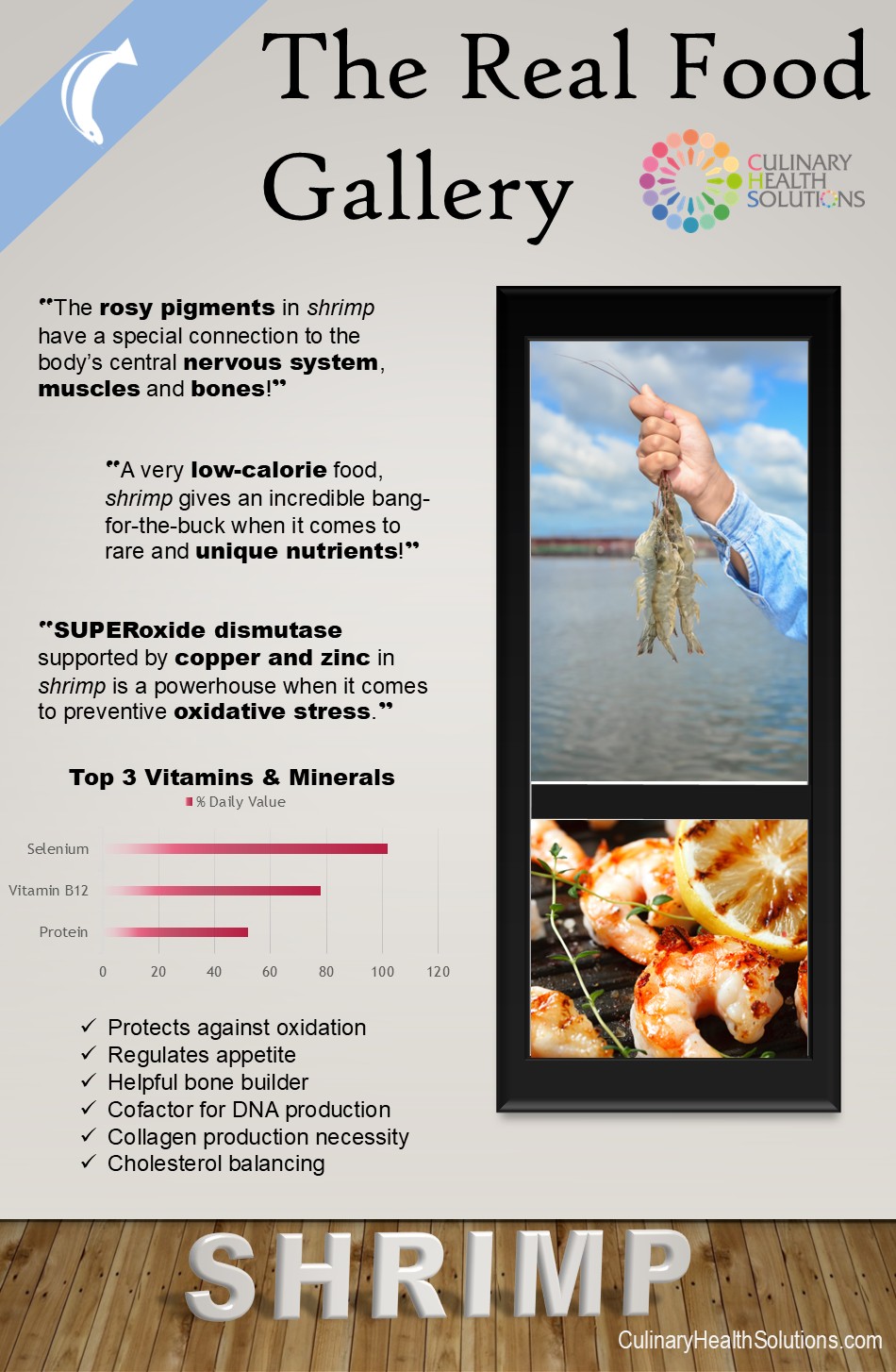Shrimp

Shrimp can be a unique source of the antioxidant and antiinflammatory carotenoid nutrient astaxanthin. It is possible for a single 4 ounce serving of shrimp to contain 14 milligrams of astaxanthin. In animal studies, astaxanthin has been shown to provide antioxidant support to both the nervous system and musculoskeletal system. In addition, some animal studies have shown decreased risk of colon cancer to be associated with astaxanthin intake, as well as decreased risk of
certain diabetes related problems. Importantly, the astaxanthin content of shrimp can vary widely, mostly in proportion to the amount of astaxanthin in their diet. In addition, the source of astaxanthin in the diet of shrimp remains an ongoing controversy. Since over half of the shrimp consumed both in the U.S. and worldwide are farmed, the diets that they consume depend on the approach of the producers. Both synthetic forms of astaxanthin and naturally occurring forms found in phytoplankton and zooplankton have been used in shrimp farming. In general, when purchasing farmed shrimp, we believe that it makes sense to select shrimp that have consumed natural and plentiful amounts of astaxanthin from natural dietary sources including marine algae and zooplankton. You will find more recommendations regarding shrimp selection in our How to Select and Store and Individual Concerns sections below.
At 56 micrograms in every 4 ounces, shrimp is an excellent source of the antioxidant mineral selenium. Recent research studies show that the selenium contained in shrimp can be well absorbed into the human body. In one study, we've seen an estimate of about 80-85% for total selenium absorption from this shellfish. Since selenium deficiency has been shown to be a risk factor for heart failure and other forms of cardiovascular disease, as well as for other problems including type
2 diabetes, compromised cognitive function, and depression, shrimp may have a unique role to play in your meal plan if your health history places you at special risk in any of these areas.
A second mineral benefit often overlooked in shrimp is its unusual concentration of copper. Several recent studies show the copper richness of shrimp to be a standout among other fish. Researchers have pointed to a copper containing protein in shrimp called hemocyanin as a likely reason for shrimp's unique copper richness. (This copper containing protein is involved is the shrimp's oxygen metabolism.)
Shrimp is often included on the "avoid" list for persons wanting to minimize their dietary intake of cholesterol. The 220 milligrams of cholesterol contained in a 4ounce serving of shrimp makes this approach a legitimate concern. However, despite its high cholesterol content, several recent research studies have noted some desirable aspects of the fat profile in shrimp. One of these desirable aspects is shrimp's omega3 fat content. Four ounces of shrimp provides about 325 375
milligrams of omega3 fatty acids, including about 50% EPA (eicosapentaenoic acid) and 50% DHA (docosahexaenoic acid). EPA and DHA are especially important omega3s for cardiovascular and nervous system health. In addition to this great mixture of omega3s, shrimp also provides an unusual omega3:omega6 ratio of approximately 1:1. Since higher ratios of omega3:omega6 are associated with decreased risk of many chronic diseases—including obesity, high blood pressure, and type 2 diabetes—this aspect of shrimp's fat content should be a huge plus, especially in meal plans with excessive amounts of omega6s. Finally, it is interesting to note that according to recent studies, cholesterol is not the only sterol in shrimp. This type of fat is found in smaller amounts in the form of clionasterol and campesterol. While chemically similar to cholesterol, these other sterols function as anti-inflammatory molecules and they are associated with decreased levels of LDL-cholesterol, which would be considered a health benefit by many researchers. When looked at from this broader perspective, risks related to the high cholesterol content of shrimp might be overshadowed by its omega3 and sterol composition—but we will need future studies to help us understand more about the big picture involving shrimp and fat. As always, if you have concerns that have you need to be cautious about cholesterol intake, discuss the inclusion of shrimp in your diet with your healthcare practitioner.
